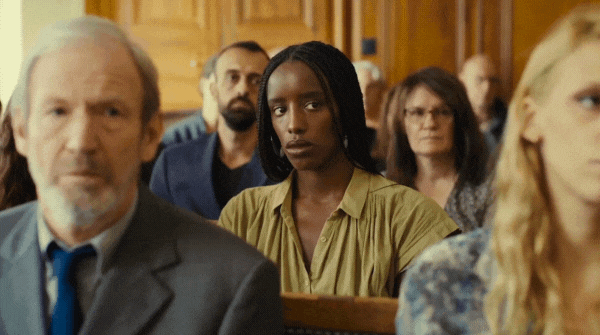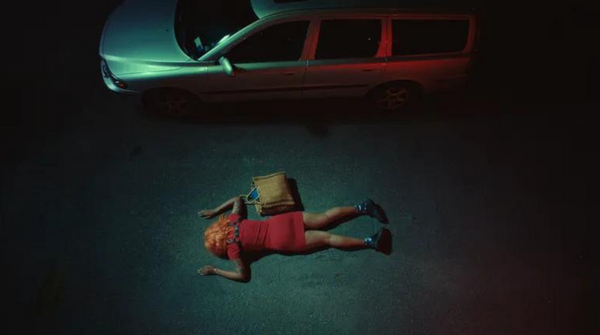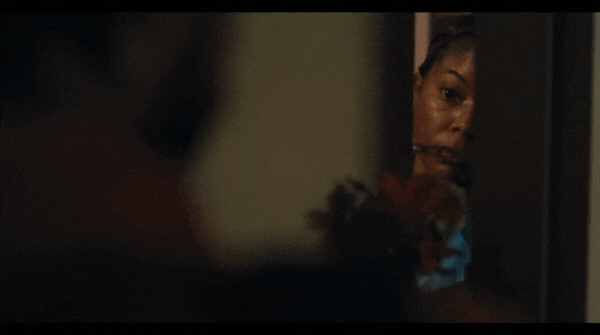

Elsewhere in the festival, prolific documentarian Alice Diop turns her hand to narrative cinema in an assured and captivated feature debut that offers a haunting spin on a courtroom drama. Loosely based on the trial of Fabienne Kabou, Saint Omer is centred around the tragic tale of a young Black woman, Laurence Coly as she stands on trial for killing her infant child.
Guslagie Malanda’s performance as Coly is as magnetic as it is haunting. She shifts between moments of charisma and charm to hostility and despair at a moment's notice, highlighting the complicated nature of her case and her mental instability. We are guided through the case through the eyes of Rama, a stoic writer who visits the trial for inspiration for her upcoming book, based on Medea, a character from Greek mythology who murdered her two children. We, alongside Rama, are drawn into a web of conflicting narratives, half-remembered truths and dazzling fictions that highlight the case's complexity.
Diop refuses to paint any characters as heroes or villains of this story. Instead, she expertly weaves together commonalities between the two female protagonists, which shows how circumstance, familial estrangement and mental health challenges can have dire consequences for anyone. In many ways, the trial could be a metaphor for modern society and serves as a stark reminder to treat each other with empathy and compassion.

The relationship between African-Americans, land and ownership has a long and complicated history in America’s South. It is a legacy tinged with tragedies, both loud and quiet that leave a tainted inheritance that stretches back to the treachery of slavery and still lingers on today in exploitative institutional and governmental policies.
How does a community reconcile with what Julius B Fleming calls the unfinished project of emancipation?
In After Sherman, Documentarian Joss Serise-Goff offers an intimate and meditative portrait of a community that is still reckoning with unfulfilled promises and broken expectations. Goff returns to his hometown in South Carolina and expertly juxtaposes the diverse landscapes of Sherman and the intimate conversations that take place throughout the town. Goff’s camera tender lingers on conversations between friends and frank and touching interviews with community members that feel like family portraits who recount the town's history with humour and pride.
The culmination of this piece feels strongest when rooted in the town's history, centring around conversations that take place between Goff and his father, the reverend of the town. The work occasionally falters when grappling with the future of this community. It may be a question that Goff himself yet reckoned with, but there is no doubt that he understands the hope, resistance and solidarity of his hometown.

Another feature film debut is offered in the festival, this time from the multi-hyphenate artist Martine Syms, whose fun and flighty film The African Desperate is a self-assured and wry examination of a world that most of us do not occupy but have possibly experienced at least tangentially, a world inhabited by the upper echelons of liberal culture - the contemporary art scene. Through Palace, a Black MFA fine arts student, portrayed by Diamond Stingily, we experience the subtle negotiations that Black artists must make when occupying these spaces. This is perfectly captured in the film's opening sequence, where we watch Palace’s final project is assessed by a hoard of white professors whose comments range from cringe-inducing virtue signalling to passive-aggressive assertions about her work and more generally what constitutes Black identity and Black art.
The remainder of the film strikes a decidedly different tone in which a reluctant Palace is coerced into attending her graduation party; it's a hazy hangout that oscillates between laidback and wavey to surreal a tone that Syms expertly straddles and is a great indication of what’s to come from her.

How can we find new ways to help our bodies and our society heal? This is a question that is tentatively posed in Grace Ndiritu’s sumptuous experimental film Becoming Plant. Ndritu’s latest outing is a unique and thoughtful dance film which follows a group of dancers who are partaking in a psychedelic therapy session. As the film progresses we are led into abeautiful, meditative inquiry into collective trauma, healing, community and movement. The dancers naked bodies move poetically through Gaika’s compelling score, as if they had transcended the human plane of conciousness and becoming one with the plants.
Ndritu’s first feature length film continues to explore themes of the potentials of alternative therapies that she explored in previous films A Therapeutic Townhall Meeting: Healing the Museum and Black Beauty and delivers an insightful and humanistic offering that seeks to remedy to disconnection between our bodies and the world that we inhabit.

The Inspection charts the journey of Ellis Pope, a young gay Black man who, in an attempt to reconcile with his estranged mother (Gabrielle Union) joins the Marines.
Though the film is set in the era of Don’t Ask Don’t Tell - a policy that coerced LGBTQ+ service members into secrecy while doing very little to stop discrimination against them, Bratton tells a much more personal story that is inspired by events from his own life.
The film is anchored by the powerful performances by Jermey Pope and Gabrielle Union who explore their characters' complex and tenuous relationship with grace and tenderness.

Kanaval is an engrossing and sumptuous film that beautifully connects the planning and celebrations to Haiti’s rich past. Through interviews with various Carnival performers, we are led through an immersive history of the country and discover the way in which the cermoninal rituals and joyous celebrates are embedded into Haitian culture. The result is a dazzling feast for the senses - from the elaborate and fanstical costumes to the swirling beats of drums, Kanaval is a truly mesmorising watch. This is aided by the addition of black and white archival footage which beautifully connects the history of Carnival to present day performers.
Directors Leah Gordon and Eddie Hutton Mills have created one of the most intriguing and enjoyable documentary in years by adknowlogding the fractous history of the country but also celebrates the achievements of the present and hope for the future.